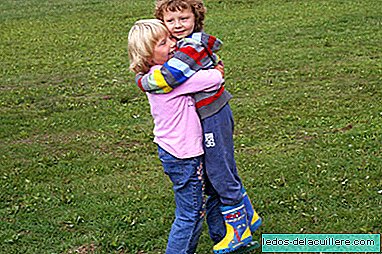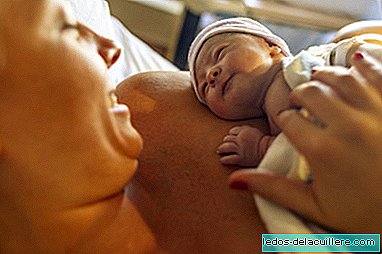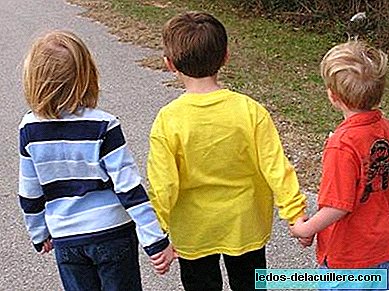
Since Valentine arrives we are going to talk about Love, that force that moves the Universe and makes us feel very intense emotions. For this we are going to interview Neus Virgili, a graduate in Psychology who is going to talk about the crush on children.
Neus Virgili has a degree in Psychology and a mother since 2010. You can find her in her blog Explorando La Maternidad, a space from which she offers information, resources and support to full-time moms who wish to live their motherhood consciously, raising their children with Respect and empathy and taking advantage of the opportunities for personal growth offered by this stage.
Can we talk about falling in love in children?
Child infatuation not only exists but is very common in young children and is an emotion that must be approached from empathy and respect.
From an adult's vision, it is easy to fall into the trap of relativizing those feelings, thinking about the little importance that this relationship will have over the years, but it is necessary to put ourselves in the place of our children. At very young ages they are able to experience very strong feelings and not because they are volatile, the situation must be downplayed, for them it is a totally real and intense emotion. In addition, from these first relationships, our children will learn to create different emotional bonds, it is part of their development.
When a six-year-old girl, for example, falls in love?
As in many other aspects related to the education and upbringing of our children, it is essential to validate and respect those feelings. They are emotions that are being experienced in a real way, therefore we must allow them to express them. It is not necessary to encourage or discourage, just act naturally and without judgment.
What can we do to help her manage those feelings?
To understand that your feelings are healthy and normal we must move away from situations in which the relationship is ridiculed or falls into scolding and prohibition. It is also important to remember that it is an aspect that concerns your private life, so we must preserve your privacy and not make it, even with the best of intentions, the theme of our social gatherings.
How can we convey healthy expectations about romantic love to children?
Attachment styles are related to future romantic ties.
The link that is built with the main attachment figure during the first years of life is the basis on which future relationships will be built. Through all these first interactions, children internalize a series of expectations about what future relationships will be like, what they can expect and what not from those relationships; They learn to trust or distrust others and build their own self-esteem and worldview. These mental structures, although they will continue to be remodeled throughout the life cycle, tend to remain fairly stable. It has been proven that people who develop a secure attachment during their childhood, have greater ease to get emotionally involved in their relationships and feel comfortable with the commitment and the need for sexual and emotional intimacy. In addition, they have greater social skills and trust and are satisfied with long-term stable relationships.
Do the sexualized contents of television influence children a lot?
We are exposed to a bombardment of information that exerts an effective influence on all of us, not only on children, which is why it is so important that we be aware of the information our children receive through any means of communication. Television offers a biased image of such transcendental issues as sentimental relationships and sexual life, our children are exposed to an altered reality where it is going to cost them to discern what is reality and what is fiction and where it tends to minimize the consequences and responsibilities Children are great imitators and parents can help us better understand some content by educating them on values and decision making. Some studies relate exposure to sexualized content to an increase in teenage pregnancies, but what has a crucial role is the (lack of) parental intervention.
How can we control that kind of content?
It is important that we control and limit access to some content, but without simply being a vigilant and silent presence. Nowadays movies and series rated as suitable for all audiences contain romantic scenes that give us the possibility of talking about sex naturally, not as something forbidden or sinful, but as an aspect of each one's privacy. Sex education is an issue that we should not overlook. We can help digest emotional impact scenes, address issues such as emotion management, offer them criteria for making decisions, talk about respect for oneself and the other, etc. We need to talk with them about what they are seeing and hearing, to avoid that what they see or tell them is the only information to which they have access.
How does a child's parent's relationship affect a child?
Ours is an eminently social species, since birth all babies are part of a social nucleus necessary for their subsistence. The main function of the parents is to cover the dependency needs of their newborn to guarantee survival, and also to accompany them during their maturation and development until they integrate autonomously within the social world. The family has an important role in preparing the child as a social subject; It will be in the family context where you establish your first affective interactions and where you will begin to see in the first person how these relationships occur spontaneously.
From what you see in your immediate context, you will internalize what are the appropriate behaviors to interact with other individuals. However, the family is not the only social center where we develop. As the child grows, he will be incorporated into other contexts and will expand this interpersonal knowledge based on the new relationships he establishes with his peers.
If their parents separate, can that damage the idea of a relationship or relationship in the child if they do not get along? Although not all children experience separation from their parents in the same way, it is reasonable to expect them to go through periods of imbalance and crisis in which they will have to work on several aspects until a readjustment is achieved, and one of the issues they must elaborate is to recover the trust in relationships.
Being spectators of constant confrontations and hostilities between their parents has consequences for their emotional health and self-esteem; not only in the case of divorced parents, also in cases where parents do not get separated and continue to live under the same roof.
And what happens if separated parents have new partners?
In these cases it is essential not to lose sight of the fact that even if the couple ends, the relationship with the children continues, and the main objective should remain their well-being. As for their future relationships, there are those who avoid long-term relationships and do not trust marriage; while others concentrate on making their relationships stable and last.
The divorce itself is not decisive, the emotional climate after the separation can become more decisive than the breakup of the couple itself.
To achieve a rebalancing in their lives it is important that children have a space to adapt to this new family organization and that it is stable and safe for them.
We thank the psychologist Neus Virgili the interview she has given to Babies and more and we hope it has helped you to better understand your children's healthy relationship with love.












